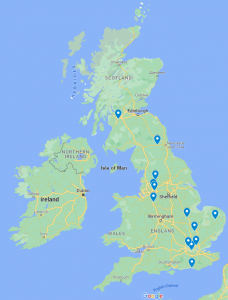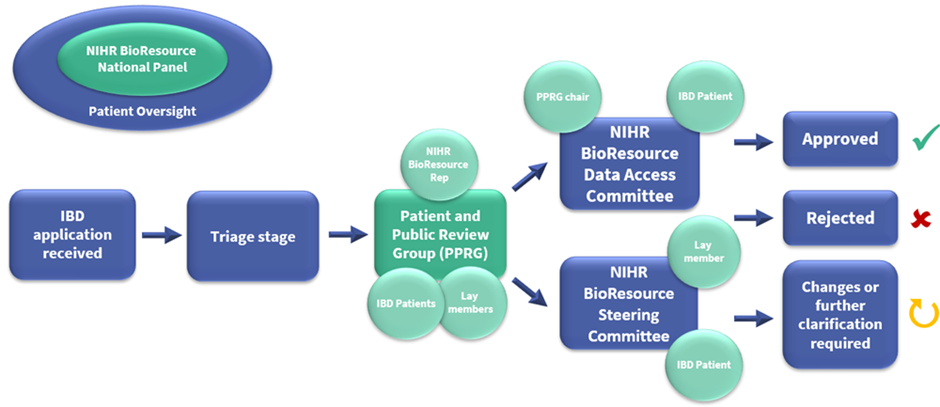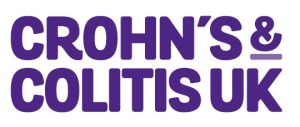Following our successful final funding assessment with HDR UK, Sarah Sleet, CEO of Crohn’s & Colitis UK and Patient Involvement and Engagement and Communications Workstream Executive Lead at Gut Reaction, reflects on the ongoing impact of people living with inflammatory bowel disease (IBD) on Gut Reaction, and our vision for the future
Gut Reaction is a health data resource designed to support medical research into IBD through safe, transparent and responsible use of patient health records. Initially funded through HDR UK – a group who work to unite the UK’s health data and enable discoveries that improve people’s lives – Gut Reaction aims to improve diagnosis and treatment options for the IBD community by securely linking patient data from different sources, making it easier for researchers to undertake vital studies. Combining knowledge and experience from many different areas including data safety, project management, researchers, NHS doctors and patients, Gut Reaction unites data with expertise and insight.

Patients have been a key part of Gut Reaction since the start; our Hub was developed alongside individuals living with IBD to address the need for more effective treatment options, and without members of the IBD community consenting to share their health data there would be no research or Hub. As we brought together our project team, it was clear that without patient views and experience our work could not succeed. Working with our Patient Partner Rosanna, we developed a patient involvement strategy to ensure that a range of views and experiences were represented within Gut Reaction. One of our earliest steps was recruiting people affected by IBD to our Patient Advisory Committee (PAC); a group of people with lived experience of IBD who support decision making and ensure that the views of the IBD community are represented within Gut Reaction
Our PAC currently includes 22 people affected by Crohn’s Disease or Ulcerative Colitis, with members from across England and Scotland, and a range of ages and backgrounds represented (Figure 1). Meeting roughly every two months, the PAC has made a huge contribution to the way that the Hub is run, and continue to influence every aspect of our work. Early discussions with the PAC helped us to understand how best to describe Gut Reaction and determine what level of information patients needed to feel comfortable with their data being used for research. Their views also helped us to decide on the types of research we should support, and which areas were most in need of innovation, ensuring our focus always remains on benefiting the IBD community. More recently our PAC have reviewed early use cases for the Gut Reaction data, made recommendations on the data access processes and our equality, diversity and inclusion (EDI) strategy, alongside contributing to conversations about the long-term plans for Gut Reaction.

Figure 1: The Gut Reaction PAC includes individuals from England and Scotland
The Gut Reaction PAC have also played an important role in deciding how to involve other patients, developing training materials to support individuals new to patient and public involvement, as well as contributing to our public events. Our PAC members bring different ideas and expertise to Gut Reaction, and this has benefited all areas of our work. Depending on their interests, PAC members are closely involved with individual project working groups – for example, contributing to our sustainability plans, governance and communications.
As Gut Reaction has evolved and grown, the PAC remain at the heart of decision making for our future, alongside playing a crucial – and expanding – role in determining whether each application for research with the Gut Reaction data (‘data access request’) should be accepted. We have co-developed a new approach to reviewing data access requests through the Patient and Public Review Group (Figure 1, PPRG). Although Gut Reaction have always involved patients in the data approval process, this new approach confirms patient input as one of the first steps, with every IBD data request reviewed by patient representatives. The PPRG will help to ensure that Gut Reaction projects are centred around the views and needs of people with Crohn’s and colitis and are ultimately driven by delivering benefits to this community.

Figure 2: Our updated approach to reviewing data access applications
Input and advice from our PAC also defines what approaches and technologies might be appropriate for future research using Gut Reaction data, particularly when they are new or have been highlighted as areas of potential sensitivity. Recent discussion topics have included computer-based assessment of data (known as ‘artificial intelligence’, AI) and whether it would be appropriate to look at how different combinations of genetic markers might contribute to an individual’s risk of developing IBD (known as ‘polygenic risk scores’). This input is key to confirming that all research is safe and appropriate from a patient perspective.
As we look towards a sustainable future for Gut Reaction, the voices of the IBD community are more important than ever in reviewing and informing our plans. From September 2022, Gut Reaction will continue through the NIHR BioResource; this approach has been agreed by our PAC and will see a long-term commitment to safely and appropriately using patient health data to drive innovation in IBD. We are delighted that most of our PAC will continue to support the work of Gut Reaction under this new model, and would like to thank them for the invaluable contribution that they have made in the last 4 years.
You can find out more about Crohn’s & Colitis UK here


